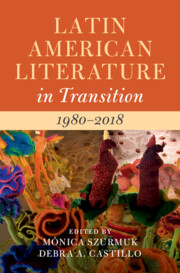Book contents
- Latin American Literature in Transition 1980–2018
- Latin American Literature in Transition
- Latin American Literature in Transition 1980–2018
- Copyright page
- Contents
- Contributors
- Acknowledgments
- Introduction
- Part I Security
- Part II New Genres
- Part III Mobilities
- Chapter 12 New Latinx/Chicanx Thought
- Chapter 13 The Boundless Dramas of Dancing Mulatas
- Chapter 14 Contemporary Stories of Deportation and Migration
- Chapter 15 The Language Shift of Literary Studies on Abiayala
- Chapter 16 South Asia and Latin America/Comparative Booms
- Part IV Positionalities
- Part V Latin American Literature in Global Markets
- Index
- References
Chapter 15 - The Language Shift of Literary Studies on Abiayala
from Part III - Mobilities
Published online by Cambridge University Press: 24 November 2022
- Latin American Literature in Transition 1980–2018
- Latin American Literature in Transition
- Latin American Literature in Transition 1980–2018
- Copyright page
- Contents
- Contributors
- Acknowledgments
- Introduction
- Part I Security
- Part II New Genres
- Part III Mobilities
- Chapter 12 New Latinx/Chicanx Thought
- Chapter 13 The Boundless Dramas of Dancing Mulatas
- Chapter 14 Contemporary Stories of Deportation and Migration
- Chapter 15 The Language Shift of Literary Studies on Abiayala
- Chapter 16 South Asia and Latin America/Comparative Booms
- Part IV Positionalities
- Part V Latin American Literature in Global Markets
- Index
- References
Summary
This chapter compares some critical approaches to literature produced by authors who self-identify as Maya, Wayuu, and Mapuche. I argue that the word “itinerary” is useful when thinking about the decisions that the critic must make while reading these literatures. The “ethnic itinerary” is one among many and, in general, reveals the understandings about the identity of the reader her/himself, rather than the author. I use specific words borrowed from native languages to imagine new/old methodologies. Words in English and Spanish become insufficient to express Indigenous epistemologies, while translation becomes a political cross-cultural stage. Indigenous literatures today are not just about books but a constant effort in translating nonverbal codes, native languages, and Indigenous paradigms. Divisive dichotomies such as oral/written, Indigenous/urban, native/migrant, and tradition/avant-garde are challenged. Despite the differences between the various nations, languages, and literary projects, contemporary Indigenous voices from Abiayala are calling for a return to their land, language, ancestors, and to themselves. While in the 1990s and 2000s literary critics and editors were showcasing the work of Indigenous authors, twenty-first-century critics are unsettling literacy itself and the matrix of coloniality. The language-body-territory thread weaves throughout the chapter.
- Type
- Chapter
- Information
- Latin American Literature in Transition 1980–2018 , pp. 231 - 249Publisher: Cambridge University PressPrint publication year: 2022

